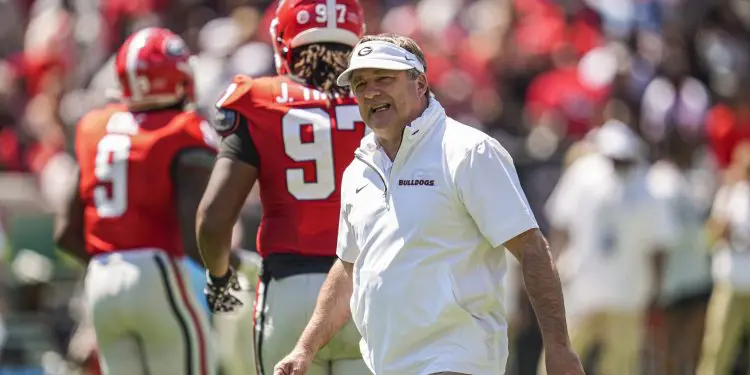
In recent years, Kirby Smart has built the Georgia Bulldogs into one of the most dominant programs in college football. Under his leadership, the Bulldogs have secured national championships, multiple SEC titles, and a consistent spot in the College Football Playoff. However, as the team enters a new chapter of its storied history, a growing pressure is mounting on Smart to maintain Georgia’s supremacy in college football. As the Bulldogs face what can only be described as an identity crisis, questions loom over whether the team’s dominance is sustainable in the long term, or whether Georgia’s once-dominant dynasty is now at a critical crossroads.
The first signs of this identity crisis started to become evident during the 2023 season, when Georgia, despite being ranked among the top teams in the country, faced uncharacteristic struggles. On paper, the Bulldogs still boasted elite talent, from quarterback Carson Beck to a defense that had long been feared across the SEC. Yet, on the field, something seemed off. The usually disciplined, hard-hitting defense appeared to be missing some of its usual aggression, and the offense lacked the explosive edge that had made them nearly unstoppable in past seasons.
Much of Georgia’s success under Smart has been built on two pillars: an unrelenting defense and a strong, balanced offensive attack. But as the Bulldogs entered 2024, they found themselves facing a series of challenges that threatened the very foundation of their success. For one, Georgia’s defense, which had been the hallmark of their national championship campaigns in 2021 and 2022, showed signs of vulnerability. The loss of several key players, both to the NFL and graduation, left significant gaps in the defensive lineup. While Smart and his coaching staff have consistently recruited at an elite level, finding the right pieces to maintain that level of defensive prowess proved more difficult than anticipated.
On the offensive side of the ball, the departure of quarterback Stetson Bennett, the emotional and tactical leader behind Georgia’s championship runs, has proven difficult to overcome. While Carson Beck, a highly-touted prospect in his own right, has shown promise, he has yet to fully fill the shoes of Bennett. Quarterbacks often dictate the rhythm of an offense, and with Beck still finding his stride, the Bulldogs’ offensive identity is in flux. The running back group, once seen as a strength, has also experienced a dip in production, with injuries and inconsistency plaguing key contributors. Even though Georgia continues to produce talented wide receivers, the passing game lacks the same potency it once had, as it struggles to find its identity and flow.
The challenges faced by Georgia this season are not solely the result of on-field issues; the entire landscape of college football has evolved, and the Bulldogs must adjust to new realities. The rise of other powerhouse programs, like Alabama, Ohio State, and Clemson, who have rebounded after brief periods of decline, means Georgia no longer enjoys the same stranglehold over the college football world that it once did. Moreover, the competitive balance in college football is shifting, with teams across the country adapting to new rules, enhanced recruiting tactics, and revamped coaching strategies. In an era where even the smallest margin for error can result in a loss, Georgia’s margin for error seems to be shrinking.
Pressure from fans, alumni, and the media is building as Georgia enters the 2024 season with the weight of maintaining its dynasty on its shoulders. There is a constant narrative surrounding Smart and his ability to keep Georgia on top, with some beginning to wonder whether he can keep up with the growing competition. Critics have questioned whether Smart’s emphasis on recruiting has compromised the development of his players, especially at the quarterback position. For a program that prided itself on a balanced and adaptable offense, Georgia’s struggles to adapt at quarterback have raised concerns about Smart’s






